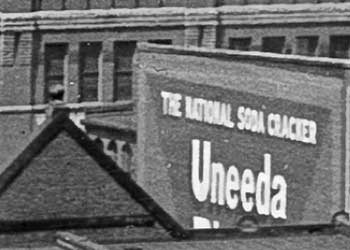The source image is in the public domain. All metadata may be used with attribution under the CC-BY License
 chattanoogahistory.COM
chattanoogahistory.COM
Two matched photos from the Paul Hiener Collection
These two photos appear sequentially in the Chattanooga Library collection but are given estimated years of 1910 for the left side and 1907 for the right. Aligning them in Photoshop revealed they were,in fact, a well-matched pair obviously taken at the same photo session.
Looking for clues as to what year these photos are actually from - The home of Dwight Preston Montague is seen completed on Cameron Hill. In another 1909 panorama, it is in the final stages of construction.
And most notably, the Hamilton National Bank building (now 1st TN) is not even under construction yet. It was completed in 1911. Source:Emporis

Painted ads on sides of buildings are numerous. Some are now famous in advertising history. The Uneeda Biscuit brand was one of the most successful branding campaigns the country had ever seen. Until 1899, to purchase soda crackers, one would take their chances with what was scooped out of the ‘cracker barrel’ of the general store. Crackers were sold straight from the barrels and boxes they arrived in. Naturally, the crackers near the top of the barrel were the freshest and best. Those toward the bottom were more questionable and likely to have been nibbled on by mice and insects.
The National Biscuit Company ended that unsanitary era with Uneeda Biscuit, a soda cracker enveloped in waxed paper inside a cardboard carton. This ‘in-er-seal’ packaging sparked a revolution in the food industry, changing the way foods were produced, distributed and sold. We still buy our favorite soda crackers from the same company, now named Nabisco.

The "Uneeda Boy"; was one of the most famous advertising icons in the world.

At the crest of Cameron Hill, a park named for Gen. Henry Van Ness Boynton (June 22, 1835 – June 3, 1905). Boynton was a Union General, newspaper correspondent, author, and was largely responsible for the creation of the Chickamauga-Chattanooga National Military Park. He also served as its first commissioner.
In 1904, a section of land on Cameron Hill was set aside for Boynton Park. The park included cannon emplacements, a pavilion, decorative water fountain, benches and plaques detailing civil war battles.

General Henry Van Ness Boynton

Chattanooga’s first power transmission lines are barely visible on the horizon. By November of 1913, electricity from Hales Bar Dam, 33 miles downstream, would be sent to the substation building at the corner of Henry and Carter Streets. The lines were 17.5 miles long.
The substation, long abandoned and considered a dangerous eyesore, is better known as Parkway Towers. It still shows evidence of its ‘powerful’ history with insulators and various steelwork protruding from the building.



